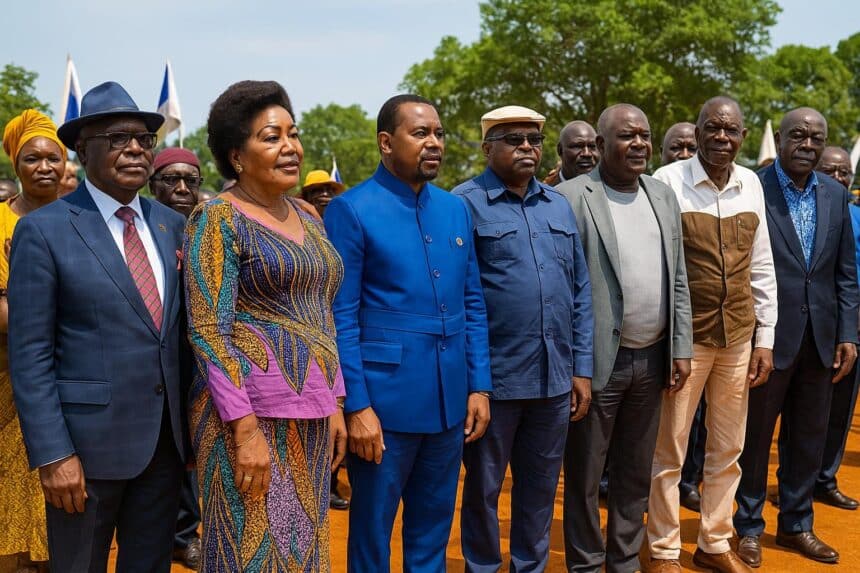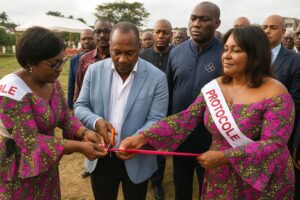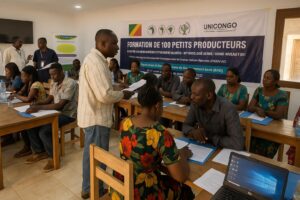A Rural Artery Reimagined for Pool Department
The rhythmic drumming that greeted Minister Juste Désiré Mondelé on 8 August 2025 in Mpiem captured more than ceremony; it marked the launch of a long-awaited upgrade of the 86-kilometre earth track connecting Mpiem to Kindamba in Pool Department.
Flanked by Prefect Jules Moukala Tchoumou and Mindouli lawmaker Adélaïde Moungani, the minister confirmed a six-month construction window and an investment envelope of 1.7 billion CFA francs, financed through the 2025 road maintenance appropriation ratified last June by the National Assembly.
Strategic Corridor Links Pool’s Breadbasket
The gravel strip snakes through fertile valleys where cassava, maize and groundnuts from Kindamba, Kimba, Mayama and Vinza currently travel by motorcycle or foot to reach markets near Brazzaville, a journey that can stretch to two days during the rainy season.
Officials argue that rehabilitating the corridor will lower post-harvest losses and halve travel times, echoing findings from the World Bank’s 2024 Africa Regional Transport Integration Project, which links road reliability to a ten-percent rise in farm-gate prices within comparable catchment areas.
Engineering Blueprint and Funding Transparency
SIPAM, a domestic contractor with previous experience on the Kinkala–Mayama segment, will clear a ten-metre right-of-way, reprofile the platform and crown the surface with twenty-centimetre lateritic layers designed to resist torrential downpours typical of southern Congo’s equatorial climate.
A second package, awarded to Universelle Atlantique BTP for 504 million CFA francs, focuses on hydrological resilience; nineteen concrete box culverts, including a double four-metre span at kilometre forty-two, will replace aging timber bridges whose structural fatigue was recorded during last year’s safety audit.
According to the Directorate-General for Road Maintenance, sensors will be embedded in the culverts to monitor water flow and alert engineers to erosion threats, a pilot initiative aligned with the African Development Bank’s Digital Transport Framework endorsed by Brazzaville in February.
Socio-Economic Ripple Effects Forecast
Economists at the University of Marien-Ngouabi estimate that each franc spent on rural access in Pool generates up to 1.6 francs in additional household income within three years, a multiplier that could see local GDP rising by five percent after project completion.
Landry Francis Gouloundou, Director-General for Road Maintenance, says the upgraded track will link farmers to regional aggregation centres, thereby reducing transport tariffs that currently absorb a quarter of crop value; his office projects a fifteen-percent cut in freight costs by 2026.
Health practitioners add that quicker evacuation routes could mean life-saving minutes during obstetric emergencies, referencing a 2022 World Health Organization survey that ranked poolland maternity transit times among the longest in Central Africa during the rainy months.
Government’s Integrated Rural Vision
The project sits within President Denis Sassou Nguesso’s “Routes pour la Production” agenda, which aims to render 3 000 kilometres of feeder roads trafficable year-round by 2030 and dovetails with the National Development Plan’s rural transformation pillar unveiled last April.
Addressing villagers, Minister Mondelé stressed that the Pool launch is not an isolated showcase but the first of twenty-four rural corridors programmed for 2025-2026 under a tripartite financing arrangement involving the treasury, the Road Fund and concessional partners.
He also announced that independent auditors from the Supreme State Control will certify expenditures monthly, a transparency measure welcomed by civil-society observer Platforme Paix et Route, which has credited recent oversight reforms with reducing cost overruns on national highways by twelve percent.
Stakeholder Voices and Timetable
Resident farmer Jean-Baptiste Makaya told this magazine that traders once refused to collect his pineapples during heavy rains; with the new culverts, he expects lorries to reach his village even in December, traditionally the most challenging month for logistics.
Prefect Tchoumou meanwhile highlighted security dividends, noting that reliable patrol access can deter sporadic banditry on remote stretches, an assessment consistent with the African Union’s 2023 policy paper linking rural road density to improved state presence and conflict mitigation.
Construction supervisors project that earthworks will reach the halfway mark by late October, after which drainage structures will be installed ahead of the November rains; commissioning is therefore tentatively set for early February, subject to material deliveries from the port of Pointe-Noire.
For the celebrants who danced beside yellow graders in Mpiem, the symbolism was clear: a smoother road can translate into fuller classrooms, steadier medical supplies and a stronger sense of inclusion within the national marketplace—a message likely to resonate far beyond Pool’s winding hills.
Sustainable Maintenance and Future Outlook
The Ministry has signed a five-year performance-based contract with private firm Congo Road Care to grade the surface every six months and reseed shoulders with vetiver grass, an approach praised by the Economic Commission for Africa for lowering lifecycle costs on unpaved networks.
Looking ahead, planners are studying an extension from Kindamba to the Mayombe corridor, which could integrate Pool’s farms into the Pointe-Noire-Brazzaville highway, a linkage set out in the Central African Economic and Monetary Community’s 2028 multimodal transport blueprint.
Feasibility studies begin March 2026.






















